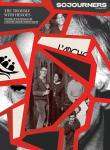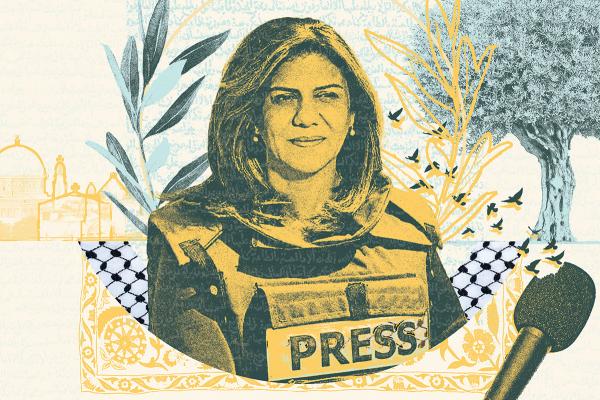PALESTINIAN AMERICAN JOURNALIST Shireen Abu Akleh was shot and killed in May 2022 while covering an Israel Defense Forces raid on a refugee camp in the Palestinian West Bank village of Jenin. Abu Akleh had been standing with a group of other journalists and was wearing a blue vest with the word PRESS printed across it when she was shot; her producer was shot in the back but survived. Hours after Abu Akleh’s death, Israeli police went into her home, took away Palestinian flags, and prevented the singing of Palestinian nationalist songs.
In mid-November, the FBI opened an investigation into Abu Akleh’s death; Israeli Defense Minister Benny Gantz said Israel would refuse to cooperate since, Gantz said, the IDF had already investigated the IDF actions in the shooting. The U.S. State Department commented, “Not only was Shireen an American citizen, she was a fearless reporter whose journalism and pursuit of truth earned her the respect of audiences around the world.”
Before her death, households throughout the Arab world knew Abu Akleh’s work. Nicknamed “the daughter of Palestine” — and “the voice of Palestine” — Abu Akleh had worked for Qatar-based news outlet Al Jazeera for a quarter century. Viewed as courageous and thoughtful, Abu Akleh inspired many, including women interested in pursuing a career in journalism in the Middle East. A common signoff for her broadcasts summarized her motivation for being a journalist: “I chose journalism to be close to people. It might not be easy to change the reality, but at least I can bring their voices to the world. I am Shireen Abu Akleh.”
Abu Akleh came from a Melkite Catholic family in Bethlehem. As a Christian accepted by Arab Muslims throughout the Middle East, her Christian faith and heritage served as a bridge between Muslim and Christian communities coming together in common beliefs around injustices in Palestine. Dr. Husam Zomlot, head of the Palestinian Mission to the United Kingdom, said, “Shireen symbolized the Palestinian people in both her life and death. Every Palestinian knew Shireen as a prominent journalist and a strong voice for truth, but few knew she was a Christian because, in Palestine, this is not an issue. In her tragic death, Shireen delivered a loud message about the brutality of the occupation and the lack of accountability and justice for her and her people.” As an outspoken advocate of justice for all, Abu Akleh was respected by both Christians and Muslims in that she highlighted the collective reality of Palestinian suffering under the human rights abuses of military occupation and control. Palestinians often speak about how the occupation does not discriminate; rather, all Arabs, regardless of religion, experience the same costs of home demolitions, military checkpoints, limited freedom of movement, and other restrictions related to the occupation.
Abu Akleh lived in the United States for a time in her early life and obtained U.S. citizenship through her mother’s family in New Jersey. Later, she spent some summers in the U.S. but lived most of the time in East Jerusalem and the West Bank. She began working for Al Jazeera in 1997, a year after the start of the network, as one of their first field correspondents. Known for her professionalism and “commitment to the story,” Abu Akleh’s reporting focused heavily on the Israel-Palestine conflict, highlighting the daily realities of living under Israeli occupation. She was known for her coverage of wars in Gaza, Israeli detention of Palestinians, and home demolitions, among other aspects of human rights abuses affecting Palestinians.
A voice of truth amid falsehoods
SHIREEN'S FRIENDS AND family knew her as a humble learner and someone full of joy, compassion, humor, and optimism, Shireen’s niece, Lina Abu Akleh, told Sojourners in October. “[Shireen] has always been my source of motivation and inspiration. I lost a major part of my life, and the void will never be filled,” Lina said. “Shireen was an angel on earth and now an angel in heaven.”
Jack Sara, president of Bethlehem Bible College in the West Bank, spoke about Shireen’s influence. “For me, she was like the targeted dove in the Banksy art that was targeted to kill every hope in the hearts of my people for peace,” Sara said. “She was an example for young women whose aspirations were the freedom of their people and the voice of truth amid falsehoods. She was humble and kind and approachable.”
Shireen has been honored by many local Christian leaders, and numerous organizations have named awards in her honor, including Birzeit University, American University of Beirut, Bethlehem University, and others. The city of Ramallah named a street after her, and the United Nations began a training program in her name for Palestinian broadcasters and journalists. Shireen was also posthumously honored with the prestigious President’s Award from the National Press Club in the United States, which wrote, “We hope that a complete investigation [of Shireen’s death] will provide a degree of justice for Shireen and her family and improved respect and safety for all journalists working in the West Bank and other conflict areas.”
The killing of Abu Akleh raised concern in the Middle East and beyond. Al Jazeera and the Palestinian Ministry of Health conducted immediate investigations, concluding that Abu Akleh was killed by IDF fire. Many other organizations and news outlets followed with their own investigations. The U.S. Security Coordinator, a State Department agency, concluded that “gunfire from IDF positions was likely responsible for the death of Shireen Abu Akleh,” while finding “no reason to believe that this was intentional,” a statement contested by Palestinians, including Shireen Abu Akleh’s family.
CNN — relying on analysis from a ballistics expert who pointed to the tight clustering of bullet marks in the area where Abu Akleh’s body fell — suggested that the killing was intentional, that the IDF had targeted Abu Akleh. An investigative report by Al-Haq, an independent Palestinian human rights organization, concluded that the shooter who killed Abu Akleh took “precise and careful aim” and that Israeli forces prevented Abu Akleh from receiving emergency medical attention. Israeli human rights organization B’Tselem said that the killing resulted from Israel’s open fire policy. Shireen’s brother, Anton, told Al Jazeera: “There were more than 16 shots fired toward Shireen and the media and her colleagues who were standing in that alley. They even targeted the person who was trying to pull her into safety after she was shot down.”
‘The family should be given time to grieve’
MEMBERS OF Shireen Abu Akleh’s family met with officials worldwide, advocating for complete and transparent investigations into her killing. Shireen’s niece Lina has been recognized as one of Time’s 100 emerging leaders for her insistence that Israel’s treatment of Palestinians must be scrutinized. The family wrote an open letter to President Joe Biden before his July 2022 trip to the West Bank and other parts of the Middle East. They derided the administration’s lack of action to that point, characterizing it as enabling Israel’s extrajudicial killing.
Lina described attacks by Israeli forces on Shireen’s funeral as “brutal” and said the Israelis restricted people’s access to the church where the funeral was held; she said even her father, Shireen’s brother, was barred from entering for some time. The family’s treatment at the funeral, Lina said, was “shocking and cruel beyond words.”
In addition to pursuing legal recourse and investigations by independent states, Shireen’s family has sought and received support from the global Christian community. In October, family members visited with Pope Francis at the Vatican and, according to family members, received his blessing and support. During that visit, the Melkite Greek Catholic Patriarchate of Antioch and the Higher Presidential Committee for Church Affairs in Palestine held a Mass at Rome’s Basilica of Saint Mary in Cosmedin.
“We were very grateful that we had the opportunity to meet the pope and receive his blessings in our pursuit for accountability and justice for Shireen, as Shireen is a Catholic Palestinian,” Lina told Sojourners.
But ultimately, Lina said, it shouldn’t be up to the family to advocate for accountability and justice; the family should be given time to grieve. “The lack of international support and action [from government officials] has yet again proven the double standards and hypocrisy of the international community,” Lina told Sojourners, stressing that “it is important that concrete action be taken to hold the perpetrators accountable for the killing of my one and only aunt.”
A welcome development
THE KILLING OF Shireen Abu Akleh was not an isolated incident. According to Reporters Without Borders, more than 30 journalists have been killed by Israeli security forces in the West Bank and Gaza since 2000, and 140 violations (including shootings, beatings, and killings) against Palestinian journalists have occurred since 2018. Israeli forces killed 60 Palestinians in the first half of 2022, compared to 2021 when 70 Palestinians were killed the whole year — which itself was a significant increase from 20 deaths in 2019 and 19 deaths in 2020. In addition to violence, Palestinian journalists experience significant restrictions on freedom of movement and travel. Since the second intifada, special Israeli travel permits have been required for Palestinian journalists. Seeking such permits often requires long bureaucratic processes that can extend for weeks or months and often result in denied requests.
Several advocacy groups in the United States, including Christian groups such as Churches for Middle East Peace (CMEP), of which I am executive director, called the FBI investigation into the killing of Shireen Abu Akleh a “welcome development.” In a letter to U.S. Secretary of State Antony Blinken, the groups argued that “the U.S. government must ensure that those responsible for her death are held fully accountable and that any role U.S. defense materials or services might have had in her killing is thoroughly documented.” Blinken, who met with family members in July, asked Israel to review its rules of engagement governing when live fire can be used in the West Bank. He reasoned that the shooting either infringed on the rules of engagement or that they should be changed if an Israeli soldier shot at a member of the press who was clearly marked as such.
Abu Akleh’s killing accentuated the concern that civilian deaths at the hands of the Israeli military rarely result in investigations or accountability. Human rights activists in the United States and Palestine draw parallels between the Black Lives Matter movement and concerns that Palestinians rarely receive equal civil rights and justice under the law. People have used social media to respond to the deaths of Palestinians by using hashtags such as #PalestinianLivesMatter and #ICantBreathe to emphasize similarities between the quest for racial justice in the United States and the pursuit of equal rights for Palestinians. Advocates express concern about whether the billions of U.S. dollars spent in foreign assistance to the government of Israel might be used in maintaining the ongoing military occupation of the millions of Palestinians living in East Jerusalem, the West Bank, and Gaza.
While accountability advocates continue their attempts, Shireen’s words speak to the ongoing efforts to end the occupation. “Despite the dangers and threats, we must be keen to do our job,” Abu Akleh said.
A tribute to Shireen Abu Akleh’s life and work includes the willingness of people to open their eyes to what is happening in the Middle East. During an Al Jazeera broadcast, Abu Akleh said of her experiences, “I will never forget the volume of destruction, nor will I forget that death was sometimes very close to us.” She suffered death in the middle of doing the work she loved and left the world with a resounding message about the suffering of Palestinians, as well as their bravery, perseverance, and desire to live in freedom.

Got something to say about what you're reading? We value your feedback!






